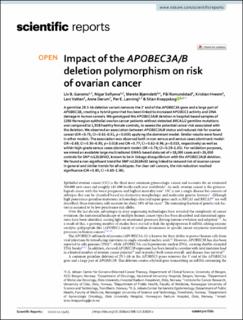Impact of the APOBEC3A/B deletion polymorphism on risk of ovarian cancer
Gansmo, Liv Beathe; Sofiyeva, Nigar; Bjørnslett, Merete Pauline; Romundstad, Pål Richard; Hveem, Kristian; Vatten, Lars Johan; Dørum, Anne; Lønning, Per Eystein; Knappskog, Stian
Journal article, Peer reviewed
Published version

Åpne
Permanent lenke
https://hdl.handle.net/11250/2987376Utgivelsesdato
2021Metadata
Vis full innførselSamlinger
- Department of Clinical Science [2294]
- Registrations from Cristin [9489]
Sammendrag
A germline 29.5-kb deletion variant removes the 3’ end of the APOBEC3A gene and a large part of APOBEC3B, creating a hybrid gene that has been linked to increased APOBEC3 activity and DNA damage in human cancers. We genotyped the APOBEC3A/B deletion in hospital-based samples of 1398 Norwegian epithelial ovarian cancer patients without detected BRCA1/2 germline mutations and compared to 1,918 healthy female controls, to assess the potential cancer risk associated with the deletion. We observed an association between APOBEC3A/B status and reduced risk for ovarian cancer (OR = 0.75; CI = 0.61–0.91; p = 0.003) applying the dominant model. Similar results were found in other models. The association was observed both in non-serous and serous cases (dominant model: OR = 0.69; CI = 0.50–0.95; p = 0.018 and OR = 0.77; CI = 0.62–0.96; p = 0.019, respectively) as well as within high-grade serous cases (dominant model: OR = 0.79; CI = 0.59–1.05). For validation purposes, we mined an available large multinational GWAS-based data set of > 18,000 cases and > 26,000 controls for SNP rs12628403, known to be in linkage disequilibrium with the APOBEC3A/B deletion. We found a non-significant trend for SNP rs12628403 being linked to reduced risk of ovarian cancer in general and similar trends for all subtypes. For clear cell cancers, the risk reduction reached significance (OR = 0.85; CI = 0.69–1.00).
